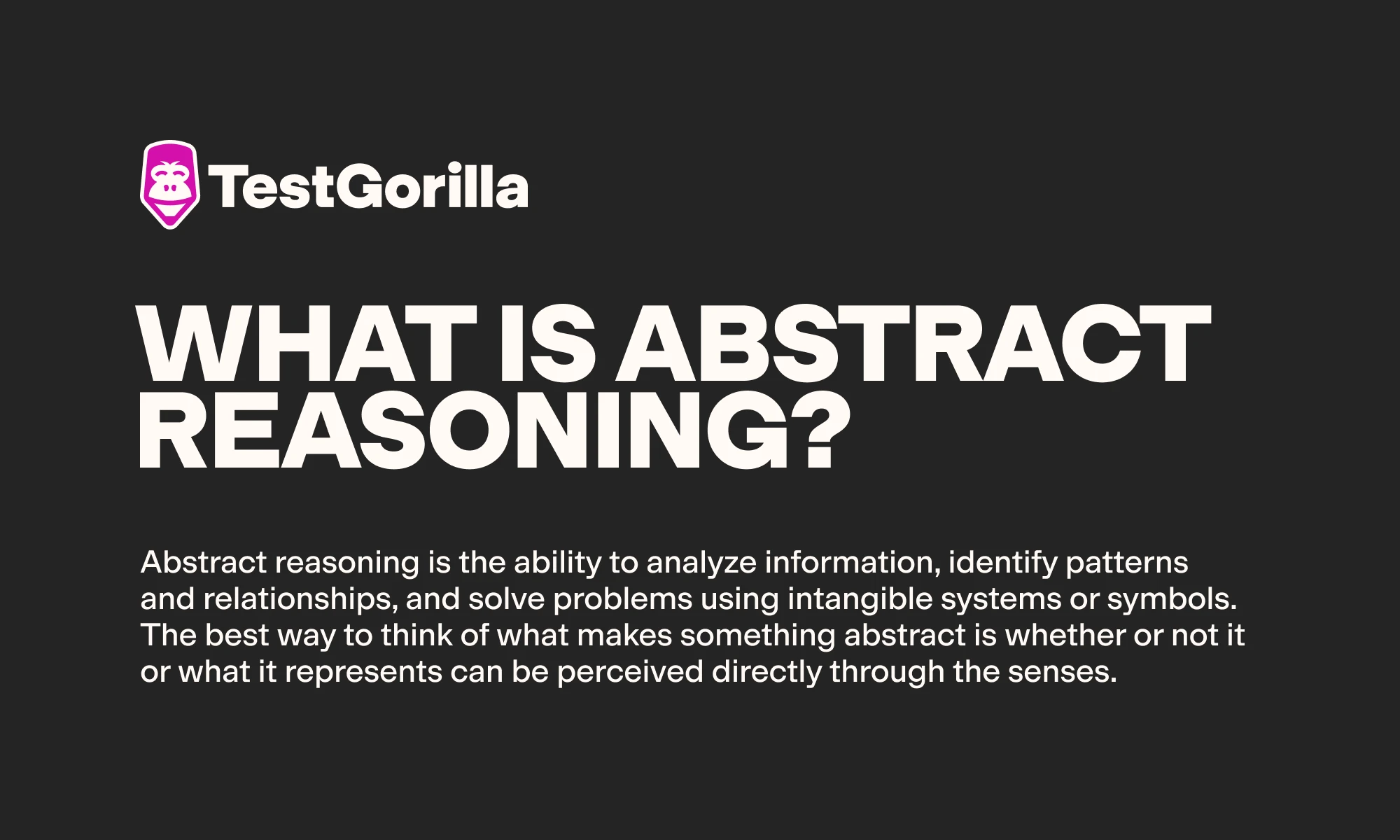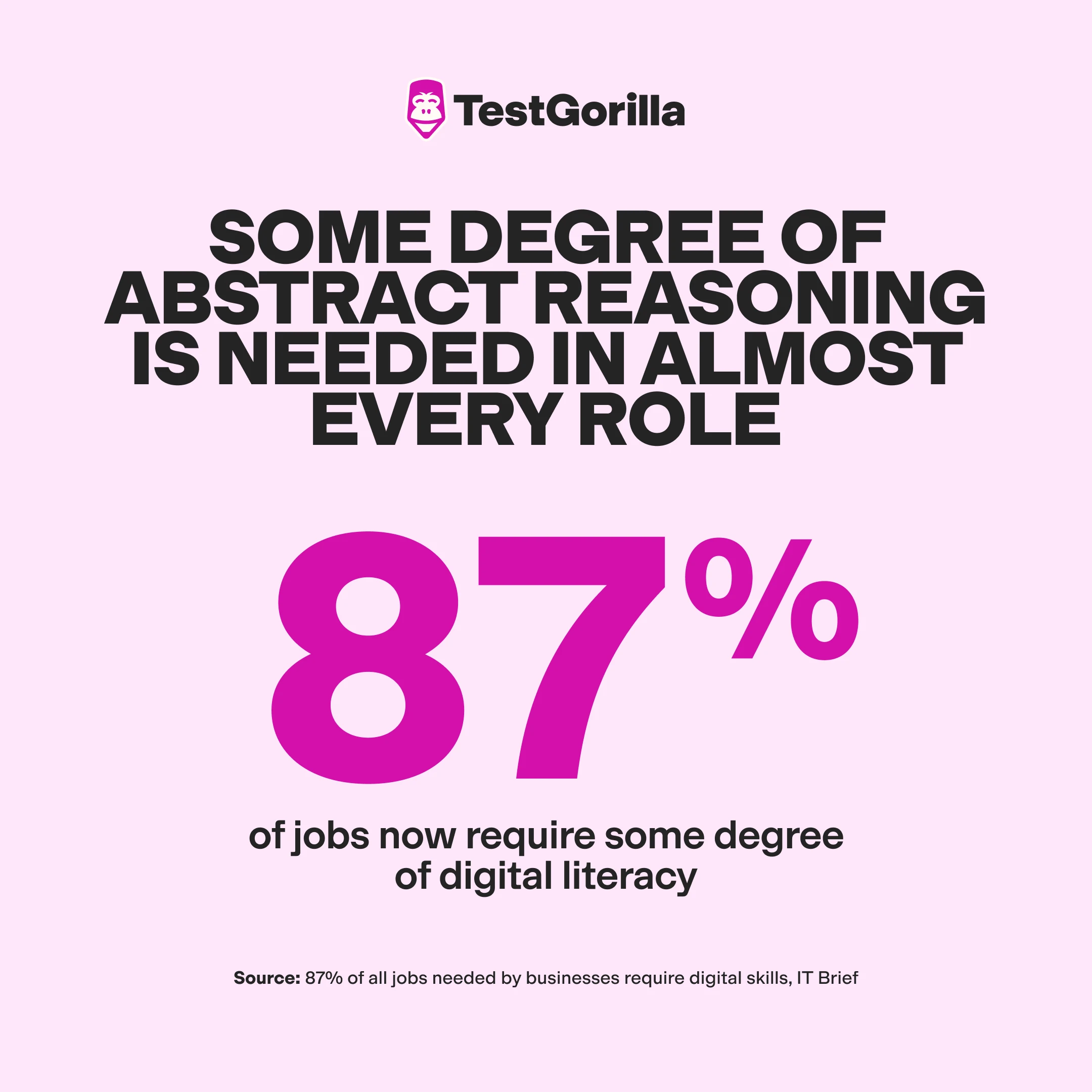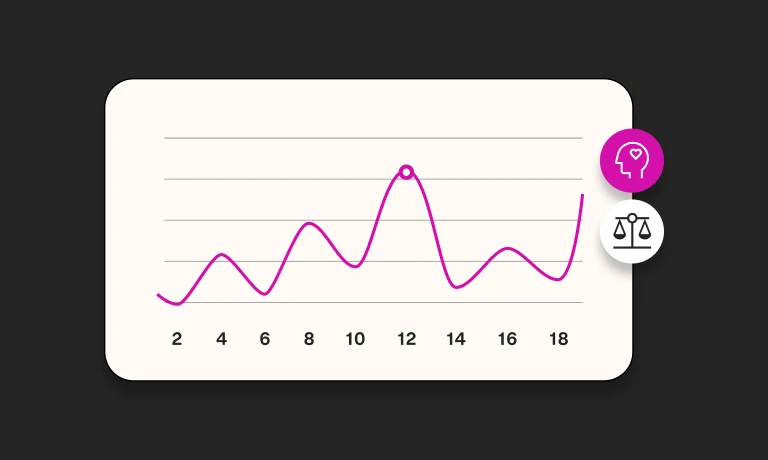In a working world that’s becoming more digitized and data-driven by the day, the need for people who can work with abstract concepts like numbers, data, and software is greater than ever. But why are some people really comfortable working with abstractions, and others are left scratching their heads? It all comes down to abstract reasoning. In this article, we explain what abstract reasoning is, why it’s crucial for businesses, which jobs need it most, and evidence-based ways to test candidates for abstract reasoning skills.
Key takeaways
Abstract reasoning is the ability to work with abstract concepts or intangible systems.
Almost all modern roles require some abstract reasoning skills, but it’s especially needed in jobs involving mathematics, analytics, or computer programming.
It’s essential for hiring managers and recruiters to test for abstract reasoning to predict job success for roles where it’s required.
TestGorilla has evidence-based tests for assessing abstract reasoning and related skills.
What is abstract reasoning?
Abstract reasoning is the ability to analyze information, identify patterns and relationships, and solve problems using intangible systems or symbols. (While words often do point to abstract concepts, problems or ideas expressed verbally typically relate to verbal reasoning.)
The best way to think of what makes something abstract is whether or not it or what it represents can be perceived directly through the senses.
For example, a multiplication symbol (x) is abstract because in and of itself it holds no meaning. Rather, it represents the multiplication of a number by another number. In contrast, a potato is typically not abstract because the meaning of “potato” is held within the object itself, and in most cases, a potato doesn’t symbolize another thing.
If this sounds a little, well, abstract, let’s consider abstract reasoning’s cousin, mechanical reasoning.
People with strong mechanical reasoning skills (such as motor mechanics) are able to grasp complex systems (such as a car engine), take them apart, put them back together again, and identify and solve problems within them.
Strong abstract reasoners do the same with intangible systems – such as complex data structures, large financial models, or software architecture. Unlike a car engine, these are things we can’t see or touch. Working with intangible systems requires you to form conceptual models and reason through them.
Research has found a strong relationship between advanced abstract reasoning skills and computer programming ability, accountancy, and virtually all technical roles.
Keep in mind, though, that abstract reasoning exists on a scale, and today, most job roles require it to some degree (more on this in a bit). Even using a smartphone or navigating digital spaces requires abstract reasoning skills. For instance, understanding that the “Trash” bin on a computer operating system is a place to drag and drop unneeded files would be impossible without some abstract reasoning ability.
Looking for abstract reasoning skills?
Use our abstract reasoning test to find candidates who can recognize patterns, solve problems, and make logical decisions on the fly.
Abstract reasoning in action
To help make it a little more concrete, here are some examples of cognitive abilities and actions involved in abstract reasoning:
1. Pattern recognition
Pattern recognition is the ability to spot recurring structures or trends within sequences of events or systems. For example, you might observe the pattern A, C, E, G (skipping one letter), and predict the next letter is I.
In the workplace, pattern recognition can translate like this: A data scientist might notice that sales consistently spike after certain marketing campaigns, allowing them to optimize campaigns accordingly.
2. Problem solving
Problem solving involves identifying, analyzing, and resolving issues using systematic methods and critical thinking. For example, a software engineer uses their abstract reasoning skills to make sense of the code they’re working with, then troubleshoot and debug problems within it. Without strong abstract reasoning skills, code will appear as a sea of inscrutable text, making problem-solving impossible. Software engineers with very good abstract reasoning skills will be able to solve increasingly complex problems that may leave others with a headache.
3. Classification
Classification involves organizing objects, ideas, or information into categories based on shared characteristics.
For example, a marketing analyst classifies customer data into segments based on abstract categories. They might give these groups a name, and place similar people or things into this same category.
Why abstract reasoning is essential in the modern workplace
In the days before computers, basic abstract reasoning wasn’t as in demand, as most products and business operations were tangible and tied to physical objects.
Today is a different story. A whopping 87% of jobs require some degree of digital skills – with experts predicting this trend will only accelerate in years to come. This means that some degree of abstract reasoning is needed in almost every role. Here are some examples that show how basic abstract reasoning skills are becoming more important:
Understanding flow charts or diagrams: The use of flowcharts or business process diagrams on platforms like Miro is increasingly common. The ability to make sense of a flowchart referencing a business plan or strategy would be impossible without some abstract reasoning skills.
Understanding data visualizations: Many roles – even creative ones like marketing – require the ability to interpret data visualizations such as line and bar charts. These are abstract symbols that wouldn’t be intuitive without abstract reasoning skills!
Data-driven decision-making: Non-technical leaders and decision-makers increasingly use data as a key part of the decision-making process. Interpreting this data to assess the likelihood of future events and choose the best course of action demands varying degrees of abstract reasoning ability.
As mentioned, abstract reasoning skills exist on a spectrum. Here’s what advanced abstract reasoning skills help people do:
Develop software architecture: While there are many computer programmers who can write and debug code, they may not have the ability to develop innovative, complex software architecture that will really move the needle.
Multivariate analysis: Simple analytics allow individuals to determine simple relationships between two variables. Very strong abstract reasoners have the capacity to produce insights from a wide range of data points.
Complex predictive modelling: Building predictive models to anticipate outcomes in complex systems like the NASDAQ requires strong abstract reasoning skills.
The best insights on HR and recruitment, delivered to your inbox.
Biweekly updates. No spam. Unsubscribe any time.
Top jobs that require abstract reasoning
Some degree of abstract reasoning is required to do virtually all jobs today, but there are some roles where it’s much more important than others. These include:
Data Scientist: Abstract reasoning is crucial for interpreting complex datasets, identifying patterns, and developing predictive models from various data sources.
Business Analyst: Requires abstract reasoning to analyze complex business processes, identify inefficiencies, and recommend improvements based on data and trends.
Software Engineer: Needs abstract reasoning to understand and design intricate algorithms, debug complex code, and optimize system architecture.
Financial Analyst: Relies on abstract reasoning to analyze financial data, identify market trends, and forecast future financial performance based on economic indicators.
Product Manager: Uses abstract reasoning to conceptualize product development strategies, integrate user feedback into design plans, and manage complex project requirements and stakeholder needs.
If you’re hiring for any of these roles, you’ll want to test your candidates’ abstract reasoning skills.
Types of abstract reasoning tests
Here are the most common ways abstract reasoning is measured:
Matrix tests: These ask test-takers to identify relationships between shapes or patterns in a grid. Matrix tests assess the ability to recognize underlying rules and apply them to find missing elements.
Series completions: In this type of test, participants analyze a sequence of items to predict the next in line. Series completions assess individuals’ capacity to understand logical progressions and infer patterns.
Logic grid puzzles: These require solvers to match different categories based on given clues, measuring their ability to draw logical conclusions and solve complex problems.
Pattern recognition tests: These tests show a series of symbols or numbers in a sequence, and assess the test-takers ability to deduce a pattern. Our image-based abstract reasoning test works this way.
Understand candidates’ abstract reasoning skills with TestGorilla
Abstract reasoning is the ability to detect patterns, categorize, and solve problems to do with intangible things like symbols or systems. In the workplace, it’s most related to being good with data, code, and analysis, but in an increasingly digital workplace, it’s becoming more important for everybody. But what’s the best way to identify candidates with strong abstract reasoning skills? Luckily, it doesn’t take an abstract reasoning whizz to find a solution for that. At TestGorrilla, we’ve got you covered! We have evidence-based tests to help you identify candidates with the skills you need:
Abstract reasoning: Our image-based abstract reasoning test evaluates a person’s ability to identify patterns and respond quickly under time constraints. It will help you identify agile learners and problem-solvers who can handle novel scenarios efficiently.
Computational Thinking: This tests candidates’ ability to think abstractly, work with algorithms, recognize patterns, and solve complex problems.
Verbal Reasoning: People who are strong abstract reasoners often need to work with others who are less so. In these cases, communication can be a challenge, so it’s worth finding candidates who are adept at both abstract reasoning as well as verbal reasoning.
Critical Thinking: It’s what makes up the “reasoning” in “abstract reasoning.” This test assesses candidates’ logical reasoning, creativity, evaluation, and strategizing chops.
Ready to get started with TestGorilla? Sign up for a free plan or register for a free 45-minute demo today!
FAQs
What are people with high abstract reasoning good at?
In the workplace, people with high abstract reasoning typically excel at working with numbers, data, or IT. They’re great at creating mental models of complex, intangible systems, solving problems, and making connections that others can’t see.
What is an example of abstract reasoning?
An example of abstract reasoning is the ability to make conclusions from incomplete data and predict future outcomes. This is helpful in finance and other roles that involve working with data.
Is abstract reasoning high IQ?
Being strong in abstract reasoning is part of having a high IQ, but it’s not the complete picture. The Wechsler Adult Intelligence Scale IQ test comprises verbal comprehension, perceptual reasoning, working memory, processing speed, and fluid reasoning. Abstract reasoning is closely related to perceptual reasoning and fluid reasoning, loosely linked to working memory and processing speed, but unrelated to verbal comprehension.
You've scrolled this far
Why not try TestGorilla for free, and see what happens when you put skills first.





















